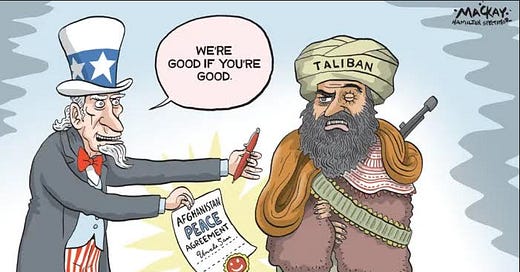“We don’t negotiate with terrorists.”
Sure thing, Mr. President. Except that we do.
Take, for example, the Agreement for Bringing Peace to Afghanistan (also known as the Doha Agreement or the Doha Accord). Never heard of it? Let me help you out.
In early 2020, delegates from the United States government met with representatives of the Taliban to negotia…
Keep reading with a 7-day free trial
Subscribe to Grumpy Combat Veteran to keep reading this post and get 7 days of free access to the full post archives.



